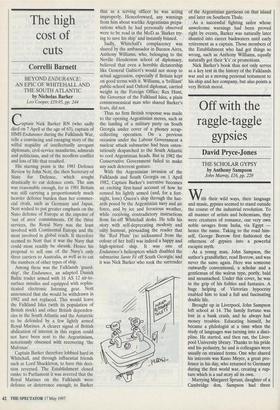Off with the raggle-taggle gypsies
David Pryce-Jones
THE SCHOLAR GYPSY by Anthony Sampson John Murray, £16, pp. 229 With their wild ways, their language and music, gypsies seemed to stand outside the course of the industrial revolution. To all manner of artists and bohemians, they were creatures of romance, our very own noble savages from India, via Egypt hence the name. Taking to the road him- self, George Borrow first fashioned the otherness of gypsies into a powerful escapist myth.
As a young man, John Sampson, the author's grandfather, read Borrow, and was never the same again. Here was someone outwardly conventional, a scholar and a gentleman of the walrus type, portly, bald and moustached. Under this cover, he was in the grip of his foibles and fantasies. A huge helping of Victorian hypocrisy enabled him to lead a full and fascinating double life.
Brought up in Liverpool, John Sampson left school at 14. The family fortune was lost in a bank crash, and he always had money troubles. Educating himself, he became a philologist at a time when the study of languages was turning into a disci- pline. He started, and then ran, the Liver- pool University library. Thanks to his pride and his pedantry, he and is colleagues were usually on strained terms. One who shared his interests was Kuno Meyer, a great pro- fessor in his day, who returned to Germany during the first world war, creating a rup- ture which is a sad story all its own.
Marrying Margaret Sprunt, daughter of a Cambridge don, Sampson had three children. Eventually he was to set them up in a house he built in Bettws, as remote a place as any in north Wales. All his wife's complaints of loneliness were rejected on the grounds that he needed to be close to the Welsh gypsies whom he was studying. As far as it went, this was true. To keep themselves apart, especially from the law, the gypsies had preserved their own lan- guages of Romani and Shelta, in various dialects with borrowings from here and there. This was disappearing beyond recall at the point when Sampson began to note it down. A Romani dictionary was his life's work.
The gypsies themselves welcomed Samp- son as a kindred spirit. They were to call him the Rai, or leader, in an echo of Bor- row's Romany Rye. Carousing with him around the camp-fire were Augustus John, his closest friend, Arthur Symons, and others whom Sampson thought pre- sentable. Settled and housed as they now are, some elderly gypsies still recall the Rai with affection.
Relations with pretty Esmeraldas and Carmens probably stopped at flirting. Sampson used to take along with him a harem of chosen researchers, ecstatic wor- shippers, their heads throbbing with gypsy romance. Not surprisingly, his wife finally left Bettws, and the family broke up.
Anthony Sampson is not quite sure what to make of this grandfather. That imposing dictionary, some inherited Augustus John drawings, the unexpected roistering, are the stuff of legend. Perhaps a self-same gene drove him to begin his own journalis- tic career on a black magazine in South Africa.
Gypsy exoticism, on the other hand, was too much for Michael, the Rai's eldest son and Anthony's own father. Curling up like a hedgehog, as he put it, he sought safety in convention, repressing any show of emo- tion. It was not possible for Anthony to know such a father. The Rai spread loss and regret down two generations.
And then there was Aunt Mary, who wept when first she came to the house. Large and plain, she was a school-teacher in Edinburgh. The young Anthony soon guessed that she must be the illegitimate daughter of the Rai, but she and the other grown-ups were determined to keep the family skeleton deep in the cupboard.
Dying at a great age in 1990, Aunt Mary left clues for Anthony. After a paperchase ending in the Liverpool University archives, he discovered which one of the harem traipsing to the gypsies with the Rai had been Aunt Mary's mother. Letters and poems show that the Rai enjoyed the roles in which he cast himself, whether as honorary gypsy, lexicographer or consum- mate bigamist. Yet more hypocrisy, of course, and the secrets might have been concealed from watchful eyes, never to be revealed. That would have been a pity. This book makes amends, and it is a pleasure in itself.



































































 Previous page
Previous page